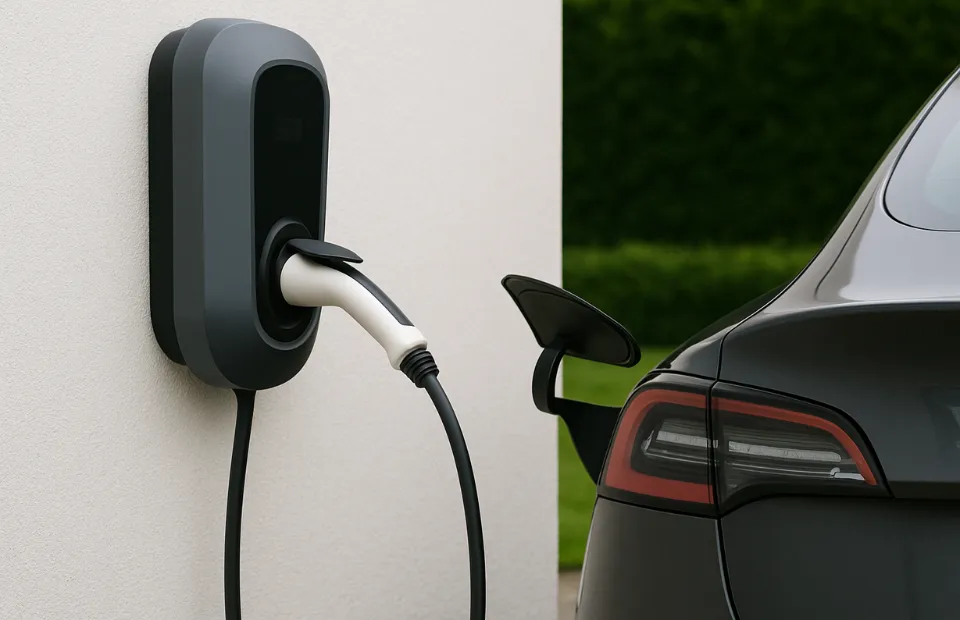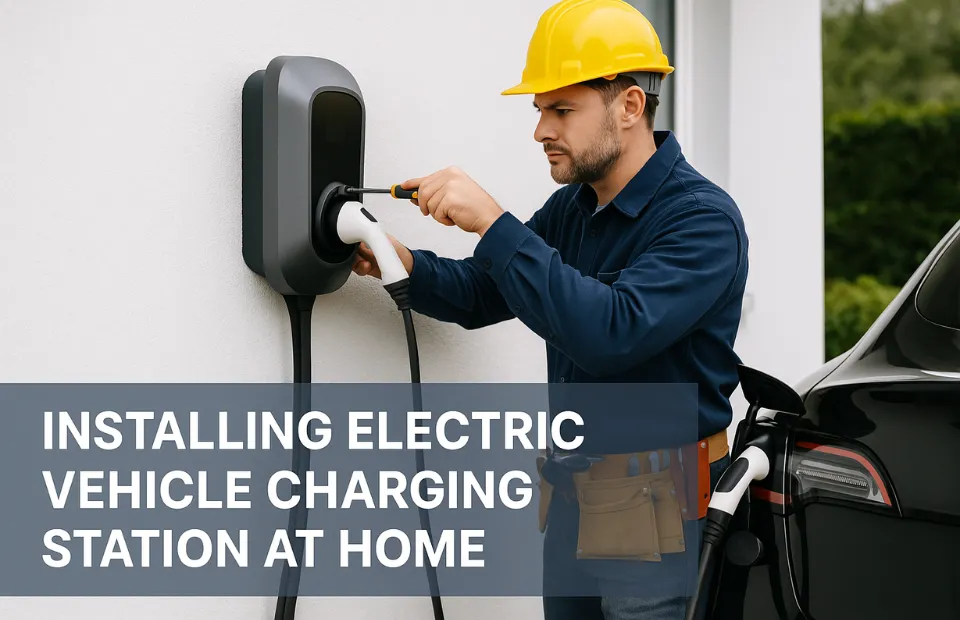With the rise of electric cars going on, installing electric vehicle charging stations at home will provide freedom and ease. You’re not searching for gas stations or standing in line anymore. However, installing a home EV charger is one extremely important step. From knowing costs and charger types to exploring benefits and selecting the best match for your electric vehicle, this guide will provide you with all the necessary knowledge for understanding the process.
A guide to installing electric vehicle charging station at home
Here we are about to discuss everything in detail that is considered necessary for installing electric vehicle charging station at home. So let’s proceed further!
Home installation of an electric car charger requires several important procedures to guarantee a safe and effective configuration. It will also make you understand how to set up EV charging at home. First, decide on the kind of charger you need Level 1 or Level 2; Level 2 provides faster charging periods. After choosing a charger, find a good place for installation within reach of the electrical panel in your house.
Choosing a competent electrician to assess your house’s electrical system, developing a dedicated 240-volt circuit if necessary, and handling the installation is absolutely essential. The electrician will also guarantee dedication to local safety guidelines and electrical rules. Test the charger upon installation to make sure it is operating as expected and become familiar with its running and maintenance. Correct installation ensures your electric vehicle will charge reliably and quickly. Hence, this effective electric car charger installation guide can surely help you alot.
Federal incentives for EV charger installation

The federal government provides several incentives to inspire the set up of home charging stations and the acceptance of electric cars. With a maximum credit of $1,000 for home installations, the federal tax incentive which can cover up to 30% of the cost of buying and installing an EV charger is among the main incentives.
Designed to lower customer financial load and encourage the use of greener energy, this incentive is a part of the Alternative Fuel Vehicle Refueling Property Credit Certain states and municipal governments also offer discounts, for home EV charger installation. To make the most of your savings and fully benefit from these incentives when building an electric vehicle charger at home, review the most recent federal and state initiatives.
Requirements for installing EV charger
Installing an electric vehicle charger at home calls for fulfilling specific technical and safety criteria to assure safe operation and local compliance with laws. First of all, the electrical panel in your house has to be large enough to manage the extra charger consumption. This could need adding a new specific circuit or rebuilding your panel. For this inspection as well as any required electrical work, a certified electrician is very essential.
The location of the installation should be easily reachable, well-ventilated, and sheltered from severe climate. The charger also has to be industrial safety compliant and fit for your electric car. Check with local authorities to find any particular regulations or inspections needed; certain towns may demand a permit for the installation. Following these guidelines guarantees a neat and effective EV charging set-up.
Choosing the Right EV Charger for Home
Getting a suitable EV charger for your house means weighing numerous elements to make sure it satisfies your tastes and use of power. Level 1 and Level 2 chargers are the two primarily used forms of home chargers. Typically slower and using a conventional 120-volt outlet, level 1 chargers are appropriate for overnight charging if your daily mileage is less. For people who must charge their automobiles rapidly or have greater daily usage, level 2 chargers which use a 240-volt outlet offer greatly faster charging periods.
Other considerations include the amperage of the charger, which influences charging speed, and whether it includes advanced functions like Wi-Fi connectivity for automatically tracking and monitoring charging sessions. To cut expenses, also look for compatibility with your car and any current refunds or incentives. Selecting the correct charger guarantees effective electric car charging station installation experience.
Cost to Install Electric Car Charger
Installing an electric vehicle (EV) charger at home can cost quite different, usually falling between $500 and $2,500 depending on a number of variables. First, a major outlay of funds is the EV charger device itself. Usually less costly, level 1 chargers which run from a conventional 120-volt outlet offer slower charging rates, fit for overnight charging. These chargers are really cheap. On the other hand, Level 2 chargers which need a dedicated 240-volt circuit offer quicker charging rates and are more costly, falling between roughly $300 to $1,800.
Key factors influencing electrical installation costs
One other main influence on the total cost is the electrical installation. Usually installing new circuits is necessary to install a Level 2 charger, and if your electrical panel lacks enough capacity it may need an upgrade. With labor expenses usually running from $750 to $1,250, this kind of work needs to be done by a skilled electrician to guarantee security and adherence with local electrical codes. Getting required licenses might also help to cover the general costs.
Other factors could raise the installation expenses even more. For example, the project can cost between $500 and $2,500 if the charger is placed in a detached garage or another site needing digging for underground cable runs. Moreover, custom finishing projects to hide conduit behind ceilings or walls will guarantee a neat and visually appealing installation and run from $200 to $1,000. Depending on the particular needs and conditions of the installation site, these extra expenses can greatly affect the whole expenses.
DIY Electric Vehicle Charger Installation
For those trying to cut expenses, setting up an electric vehicle (EV) charger at home might be an attractive do-it-yourself job. Still, it’s important to approach this work with a great focus on security and consideration of electrical standards. In particular, involving high-voltage systems, electrical work exposes natural hazards including fires, electrical shock, and even damage to your house and car.
Hiring an expert electrician is especially advised for people lacking the required credentials and experience. Evaluate the electrical system of your house to find out whether it can run an electric vehicle charger before starting the installation. This includes making sure your electrical panel is capable of handling the extra load and verifying its capacity. Most Level 2 chargers run 240-volt circuits, hence if your panel is already almost full-capacity, you might have to upgrade it. Make sure your panel has enough room for the new circuit breaker; if not, make plans for other improvements or a sub-panel installation.
Local rules that vary by area specific electrical installations. These rules guarantee conformity to national standards and safety.
Find out the particular needs in your area, which can call for getting licenses before beginning the project. Ignoring these rules could lead to fines, necessary rework, or even dangerous installations risking your property or yourself.
Steps for installing an EV charger outdoors
If the charger is put outside, it should be readily available and shielded from elements including the weather. After you have chosen your position and confirmed your electrical panel you can run the charger, compile the required tools. Usually these comprise the EV charging unit, suitable wiring, circuit breaker and safety gear including goggles and gloves. To be sure you have all necessary components and know the installation process, go to the installation manual. To guarantee safety, cut off your home’s main power supply before beginning any electrical project. With the given mounting hardware, secure the charger unit to the wall. Check it for uniformity and appropriate assistance.
Install the conduit that runs from the charger’s placement to your electrical panel. This involves inserting the electrical wiring through the conduit, taking measurements. Open your electricity panel, install the suitable circuit breaker for your EV charger. Usually, this involves routing the wires from the conduit to the breaker leads. With manufacturer instructions, link the wires from the conduit to the charger unit.
Usually, this means connecting the ground wire, the neutral wire, as well as the hot wires to their appropriate terminals. Verify all connections to be sure they are securely and accurately connected before turning the electricity back on. Once confirmed, turn the electrical supply back on and check the charger to be operating as it should. This is also an important step for installing electric vehicle charging stations at home. This means plugging in your electric vehicle and checking it starts to charge as predicted.
Final words
Installing electric vehicle charging station at home releases the full possibilities of owning one. Charging overnight lessens range anxiety and makes day trips smooth. Although installation’s upfront expenses could seem challenging, one should take long-term benefits into account. With federal, state, as well as local rebates and incentives available for EV chargers, their initial outlay is much lessened. Furthermore, the notable gas savings as opposed to conventional gasoline cars may build up over time. Moreover, home charging usually comes far less expensive than depending on public charging stations.
You may pick the best EV charger for your needs by carefully weighing the compatibility of your electric vehicle.
Most often used in homes, level 2 chargers provide a nice mix between cost and charging speed. Throughout the process of installing electric vehicle charging station at home, one should always consult a licensed electrician. They may inspect your electrical panel, suggest the suitable charger type and circuit layout.
FAQs
Can I install the EV charger without the help of anybody?
No, it is important to hire an electrician for installing electric vehicle charging station at home.
Are EV chargers worth the hype?
Yes, indeed especially for buyers who prefer sustainability.
Is there any permit required for installing electric vehicle charging station at home?
Yes, it depends on the location.
I’m Waqas, an electric vehicle enthusiast and tech writer with over 6 years of experience covering the EV industry. I write in-depth articles, comparisons, and reviews to help readers understand the fast-evolving world of electric mobility. From battery technology to EV launches and charging trends, I aim to make complex EV topics simple, engaging, and informative for everyday drivers and curious readers alike.






